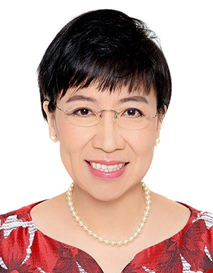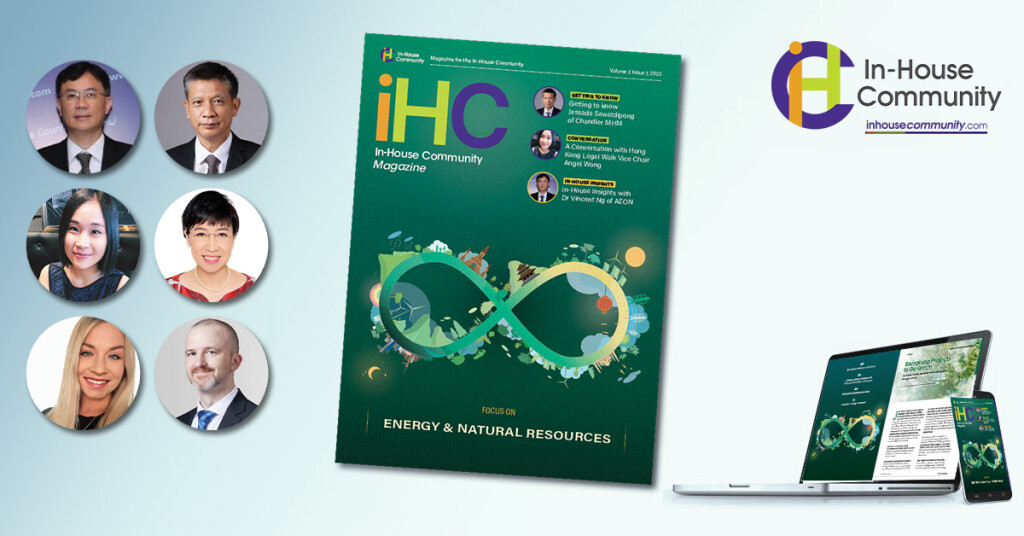
Royal Golden Eagle (RGE) Group, based in Singapore and managing a global collective of resource manufacturing companies, is looking to do things a little differently.
Where other corporates are being lambasted for their “green-washing” of brown business, RGE has created a foundation of sustainability through the integration of environmental, social and governance (ESG) considerations into their core business model. RGE’s philosophy is underpinned by the 5Cs concept: operating in a way that is good for the Community, Country, Climate, Customer and, in turn, good for the Company.
Rose Kong, Chief Legal Officer at RGE and leader of a global team of more than 100 lawyers, is responsible for RGE’s global legal, corporate governance and compliance activities and policies. She shares some thoughts on RGE’s green ambitions and the role she plays in this mission.
Give me an overview of your role as in-house counsel in the Energy & Natural Resources sector.
My first priority is to protect the interests of the shareholders and RGE group, from a legal point of view. However, besides advising on legal issues, we also provide advice from the ethics perspective. When I was called to the Bar more than 3 decades ago, part of my oath was to uphold justice. Thus, although there are commercial and legal imperatives to consider, an overarching priority is to ensure that we are doing the right thing as a business, so that our different business groups can have a positive impact on climate, nature and the communities that they operate in. This provides enormous job satisfaction. I feel fortunate to be able to work for an organisation where what we do can make a meaningful contribution to the well-being of the planet.
Another major focus in my role is the setting of standards. We are a business with more than 60,000 employees worldwide and the assets held by the RGE group of companies today exceed US$30 billion. I need to put in place and ensure adherence to not only the right but also strategic structures and systems so that we can effectively execute our role to partner with the business. Then, there is the human resources factor. Doing this job right involves making sure the organisation has the right people. I have been fortunate to be in a position to help people grow in a way that they can develop their careers and have a real impact on our business.
What are some key trends you are keeping an eye on in the overall energy sector?
A major trend in the energy sector is of course the growth of renewables and RGE has an active interest in this space. Given the scale of RGE’s operations, it is our hope that our businesses can play their part towards mitigating the impact of our operations on climate. To this end, we have made investments towards R&D in this area across all of our business groups.
Our pulp and paper group, for example, began installing solar panels at its operations in Sumatra last year. When completed, this will be one of the largest private sector installations of solar power in the region.
Are any regulations holding back more green energy initiatives? And what sort of regulations would you suggest are removed to help boost these initiatives?
We welcome initiatives by Governments and state agencies to introduce new laws and regulations that will have a positive impact on environmental standards and sustainable development. We are supportive of any efforts by Governments, in any of the countries in which we operate, to bring in regulations that will allow for the further development and uptake of green energy.
Can you give us some behind-the-scenes insight into how in-house legal teams juggle the business needs of natural resources with the social pressure of sustainability? I.e. activist, shareholder or public pressure that threatens to tie up the company’s operations.
All of the business groups in RGE have very specific, very definable long term sustainability goals against which all aspects of their operations are measured. For example, our pulp and paper and palm business groups have set long-term sustainability commitments to be achieved by 2030 that are aligned with the United Nations’ Sustainable Development goals (SDG) centred around 4 themes, Climate Positive, Thriving Landscape, Inclusive Progress and Sustainable Growth. In this connection, RGE Legal was instrumental to the negotiation and finalisation of two substantial, sustainability-linked loans (SLLs) for our downstream palm business and our pulp and paper business groups last year. A significant aspect of the SLLs is that specific performance indicators need to be met in order for these business groups to avail themselves of more favourable interest rates.
In simple terms, sustainability is integrated into our business model. We are thus able to have a positive impact on the environment while meeting commercial goals.
Another example of how the RGE legal team has played a key role in the group’s sustainability programs is we helped to create the terms of reference for our pulp and paper group’s Sustainable Forest Management Policy. In addition, our focus on sustainability also goes beyond our own business. We provided detailed input into the framing of the Transboundary Haze Act, as part of a consultation process with the private sector when the legislation was being framed back in 2014 by the Singapore Parliament.
In summary, RGE’s legal team is privileged to be in a position where there is no need for a balance to be struck between business and environmental interests, as best practices in sustainability are already so widely integrated across our operations.
RGE’s sustainability initiatives have ranged from largescale solar, as mentioned by Kong, to the world’s largest and greenest pulp mill financed and established by Bracell (a member of the RGE group of companies), and conservation and restoration through the establishment of a goal to match one hectare of conservation and restoration to every hectare of its plantation. Through these, RGE is showcasing an updated “business and usual”; one with a long-term view cogent of its lasting impact on the world. As Anderson Tanoto, Managing Director of RGE put it: “[RGE is] passionate about a cleaner, greener, more circular world. Our futures depend upon it.”

Rose Kong
Rose Kong is RGE’s first female Chief Legal Officer and an award winning senior global legal executive who has led the RGE legal team to win various accolades in Singapore, South East Asia and Asia. Rose received her LLB (Hons) from the National University of Singapore and a Masters of Business Administration from Imperial College Business School, Imperial College, University of London.
This article was published in the September, 22 issue of the IHC Magazine. To read the fill magazine, please click here

















